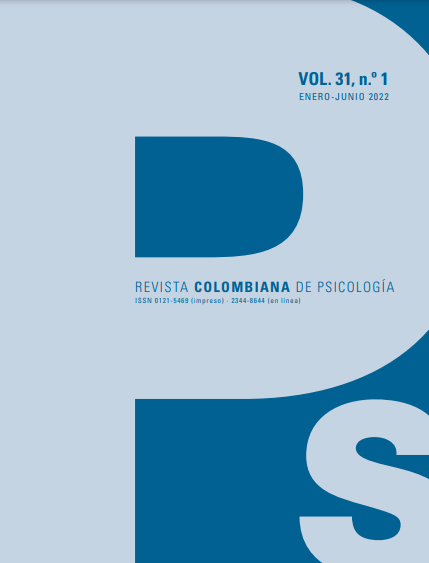Social Emotional Learning (sel) Program Among Fifth graders, Three and Six Months Later
Intervención de Habilidades Sociales en Estudiantes, Tres y Seis Meses Después de su Participación
DOI:
https://doi.org/10.15446/rcp.v31n1.83042Keywords:
elementary education students, Follow-up, social emotional learning, social vulnerability (en)entrenamiento de habilidades sociales, , estudiantes de la Enseñanza Fundamental, Follow up, habilidades sociales, vulnerabilidad social (es)
Downloads
This study carried out a follow-up three and six months after the application of a Social Emotional Learning (SEL) program, aiming to verify the maintenance of social skills in Elementary Education students in situations of social vulnerability from Rio de Janeiro, Brazil. A sample of the intervention and control groups composed of 20 students aged 10 to 13 (M = 10.3, SD = 0.8), boys and girls were selected. The SSRS (Social Skill Rating System) and the TDE (School Achievement Test) used in the intervention for teachers and students were reapplied. The results showed that the decrease in psychopathological symptoms and the improvements in academic performance were maintained after the intervention. These findings highlight the relevance of developing social emotional learning programs with elementary school students.
How to cite this article: Souza, M.S., Soares, A.B., & Freitas, C.P.P. (2021). Social emotional learning (sel) program among fifth graders, three and six months later. Revista Colombiana de Psicologia, 31 (1), 35-48. https://doi.org/10.15446/rcp.v31n1.83042
La investigación realizó un follow up de tres y seis meses después de un entrenamiento de habilidades sociales, con el objetivo de verificar el mantenimiento de habilidades sociales de estudiantes de la Enseñanza Fundamental en situación de vulnerabilidad social. Seleccionó una muestra de los grupos intervención (GI) y control (GC) compuesta por 20 alumnos, edades entre 10 a 13 (M =10,3; DE = 0,8), niños y niñas. Reaplicó los instrumentos SSRS (Social Skill Rating System), TDE (Prueba de Desempeño Escolar) utilizados en la intervención para profesores y alumnos. Los resultados demostraron que las ganancias del GI se mantuvieron y aún hubo un aumento de nuevas ganancias positivas significativas.
Cómo citar este artículo: Souza, M.S., Soares, A.B., & Freitas, C.P.P. (2021). Social emotional learning (sel) program among fifth graders, three and six months later. Revista Colombiana de Psicologia, 31 (1), 35-48. https://doi.org/10.15446/rcp.v31n1.83042
References
Abreu, S., Miranda, A. A. V., & Murta, S. G. (2016). Programas preventivos brasileiros: Quem faz e como é feita a prevenção em saúde mental? Psico-usf, 21, 163-177. https://doi.org/10.1590/1413-82712016210114.
Achenbach, T.M. (1991). Manual for the youth self-report and 1991 profile. Burlington: Department of Psychiatry, University of Vermont. https://www.icpsr.umich.edu/icpsrweb/PHDCN/descriptions/ysr-w1-w2-w3.jsp
Barreto, S. D. O., Freitas, L. C., & Del Prette, Z. A. P. (2011). Habilidades sociais na comorbidade entre dificuldades de aprendizagem e problemas de comportamento: Uma avaliação multimodal. Psico, 42, 503-510. http://revistaseletronicas.pucrs.br/revistapsico/ojs/index.php/revistapsico
Bray, C. T., & Leonardo, N. S. T. (2011). As queixas escolares na compreensão de educadoras de escolas públicas e privadas. Psicologia Escolar e Educacional, 15, 251-261. https://doi.org/10.1590/S1413-85572011000200007
Casali, I. G. (2010). La influencia de la percepción de las prácticas parentales sobre las habilidades sociales y la percepción de sí mismo en los niños de 8 a 12 años (Undergraduate in Psychology Monograph). Universidad Adventista del Plata, Entre Ríos, Argentina.
Del Prette, A., & Del Prette, Z. A. (2017). Competência social e habilidades sociais: Manual teórico-prático. Petrópolis: Vozes.
Del Prette, Z. A. P., & Del Prette, A. (2008). Significância clínica e mudança confiável na avaliação de intervenções psicológicas. Psicologia: Teoria e Pesquisa, 24, 497-505. https://doi.org/10.1590/S010237722008000400013
Dias, T. P., & Del Prette, Z. A. P. (2015). Promoção de automonitoria em crianças pré-escolares: impacto sobre o repertório social. Acta Comportamentalia, 23, 273-287. http://www.revistas.unam.mx/index.php/acom/article/view/52058/46399
Freitas, L. C., & Del Prette, Z. A. P. (2015). Social Skills Rating System – Brazilian version: New exploratory and confirmatory factorial analyses. Avances en Psicología Latinoamericana, 33, 135-156. https://doi.org/10.12804/apl33.01.2015.10
Gresham, F. M., & Elliott, S. N. (1990). Social Skills Rating System (ssrs). USA: American Guidance Service. Adaptado por Del Prette, Z., Freitas, L., Bandeira, M. & Del Prette, A. (2016). Inventário de habilidades sociais, problemas de comportamento e competência acadêmica para crianças. São Paulo: Casa do Psicólogo.
Gresham, F. M. (2004). Current Status and future directions of school-based behavioral interventions. School Psychology Review, 33, 326-343. https://doi.org/10.1080/02796015.2004.12086252
Jacobson, N. S., & Truax, P. (1991). Clinical significance: A statistical approach to defining meaningful change in psychotherapy research. Journal of Consulting and Clinical Psychology, 59, 12-19. https://doi.org/10.1037/0022006X.59.1.12
Kassambara, A. (2021). Rstatix: Pipe-friendly framework for basic statistical tests. R package version 0.7.0. https://CRAN.Rproject.org/package=rstatix
Kilian, J. M., & Kilian, D. W. (2011). A school intervention to increase prosocial behavior and improve academic performance of at-risk students. Improving Schools, 14, 65-83. https://doi.org/10.1177/1365480211399748
Krishnamoorthy, K., Lu, F., & Mathew, T. (2007). A parametric bootstrap approach for anova with unequal variances: Fixed and random models. Computational Statistics & Data Analysis, 51, 5731-5742. https://doi.org/10.1016/j.csda.2006.09.039
Libório, R., Coêlho, A., & Castro, B. (2011). Escola: Risco ou proteção para adolescentes e adultos jovens. In S. Koller & D. Dalbosco (Eds.), Adolescência e Juventude: vulnerabilidade e contextos de proteção, (pp.109-138). São Paulo: Casa do Psicólogo.
Martin, D., Martin, M., Gibson, S. S., & Wilkins, J. (2007). Increasing prosocial behavior and academic achievement among adolescent African American males. Adolescence, 42, 689. Retrieved from: https://pdfs.semanticscholar.org/caae/990fc2bea82bb330f91f525e07bbaf0ef267.pdf
Marturano, E., Elias, L., & Leme, V. (2014). Comportamentos agressivos e habilidades sociais em uma perspectiva de desenvolvimento. In Borsa, J., & Bandeira, D. (Eds.), Comportamento agressivo na infância da teoria à prática (pp. 59-78). São Paulo: Casa do Psicólogo.
McCoy, D. C., Raver, C. C., & Sharkey, P. (2015). Children’s cognitive performance and selective attention following recent community violence. Journal of Health and Social Behavior, 56(1), 19-36. https://doi.org/10.1177/0022146514567576
Michelson, L., Sugai, D. P., Wood, R. P., & Kazdin, A. E. (2013). Social skills assessment and training with children: An empirically based handbook. New York: Springer Science & Business Media.
Murta, S. G. (2007). Programas de prevenção a problemas emocionais e comportamentais em crianças e adolescentes: Lições de três décadas de pesquisa. Psicologia: Reflexão e Crítica, 20(1), 1-8. https://doi.org/10.1590/S010279722007000100002
Murta, S. G., Borges, F.A., Ribeiro, D.C., Rocha, E.P., Menezes, J.C.L.D., & Prado, M.D.M. (2009). Prevenção primária em saúde na adolescência: avaliação de um programa de habilidades de vida. Estudos de Psicologia, 14, 181-189. https://doi.org/10.1590/S1413-294X2009000300001.
R Core Team. (2020). R: A language and environment for statistical computing. R Foundation for Statistical Computing, Vienna, Austria. https://www.R-project.org/
Rodrigues, A. M. P. L. (2007). Comportamento antissocial infantil sob a perspectiva dos princípios da análise do comportamento. Dissertação de mestrado. Programa de Pós-Graduação Stricto Sensu em Psicologia.Universidade Católica de Goiás, Goiás.
Santos, A. A. A., & Fernandes, E. S. O. (2016). Habilidade de escrita e compreensão de leitura como preditores de desempenho escolar. Psicologia Escolar e Educacional, 20, 465-473. https://doi.org/10.1590/21753539/2015/02031013
Schiavoni, A., & de Cássia Martinelli, S. (2017). O autoconceito de estudantes aceitos e rejeitados no contexto escolar. Psicologia Argumento, 30, 297-305. https://biblat.unam.mx/es/revista/psicologia-argumento/articulo/o-autoconceito-de-estudantes-aceitos-erejeitados-no-contexto-escolar DOI: https://doi.org/10.7213/psicolargum.v30i69.23285
Schonfeld, D., E. Adams, R., K. Fredstrom, B., P. Weissberg, R., Gilman, R., & Voyce, C. et al. (2015). Clusterrandomized trial demonstrating impact on academic achievement of elementary social-emotional learning. School Psychology Quarterly, 30, 406-420. https://doi.org/10.1037/spq0000099
Souza, M. S., Soares, A. B., & Freitas, C. P. P. (2019). Treinamento de Habilidades Sociais (ths) para alunos em situação de vulnerabilidade social. Revista Psicologia: Teoria e Prática, 21, 135-158. https://doi.org/10.5935/1980-6906/psicologia.v21n3p159-181
Stein, L.M. (1994). tde–Teste de Desempenho Escolar: Manual para aplicação e interpretação. São Paulo: Casa do Psicólogo.
How to Cite
APA
ACM
ACS
ABNT
Chicago
Harvard
IEEE
MLA
Turabian
Vancouver
Download Citation
CrossRef Cited-by
1. Gordon P.D. Ingram, Yvonne Gómez, Marta Carolina Ibarra, Patricia Elena Jaramillo, Karen Daniela Robles, Sonia Carrillo. (2023). "Gratitude is Thanking Someone, and Happiness Is Showing It": A Qualitative Study of Colombian Children's Perspectives on Gratitude. Revista Colombiana de Psicología, 32(2), p.33. https://doi.org/10.15446/rcp.v32n2.100130.
2. Alessandra Colella, Concetta Esposito, Dario Bacchini. (2023). The Implementation of a Mobile Game for Social Inclusion in Multicultural School Contexts. 2023 IEEE International Conference on Metrology for eXtended Reality, Artificial Intelligence and Neural Engineering (MetroXRAINE). , p.917. https://doi.org/10.1109/MetroXRAINE58569.2023.10405833.
3. Diego Rodas Flores, William Ortiz Ochoa, Isabel Mogrovejo Mogrovejo. (2026). Propuesta psicoeducativa de entrenamiento en habilidades sociales para niños de educación básica desde una revisión bibliográfica. Revista Multidisciplinaria Investigación Contemporánea, 4(2) https://doi.org/10.58995/redlic.rmic.v4.n2.a190.
4. Aurora Adina Colomeischi, Andreea Ursu, Ionela Bogdan, Alina Ionescu-Corbu, Romina Bondor, Elisabetta Conte. (2022). Social and Emotional Learning and Internalizing Problems among Adolescents: The Mediating Role of Resilience. Children, 9(9), p.1326. https://doi.org/10.3390/children9091326.
5. Paola Andrea Arango Benítez, Cristian Harrison Orjuela Roa, Andrea Fernanda Buitrago Roa, Óscar Mauricio Lesmes Martínez. (2024). Importancia de las habilidades socioemocionales en la educación: una revisión documental. RHS-Revista Humanismo y Sociedad, 12(2) https://doi.org/10.22209/rhs.v12n2a05.
Dimensions
PlumX
Article abstract page views
Downloads
License
Copyright (c) 2022 Revista Colombiana de PsicologíaThe RCP is published under the Creative Commons license and can be copied and reproduced according to the conditions of this license (http://creativecommons.org/licenses/by-nc-nd/2.5). RCP articles are available online at https://revistas.unal.edu.co/index.php/psicologia/issue/archive. If you would like to subscribe to the RCP as reader, please go to https://revistas.unal.edu.co/index.php/psicologia/information/readers and follow the instructions mentioned in the webpage. Additionally, a limited number of print journals are available upon request. To request print copies, please email revpsico_fchbog@unal.edu.co.


























